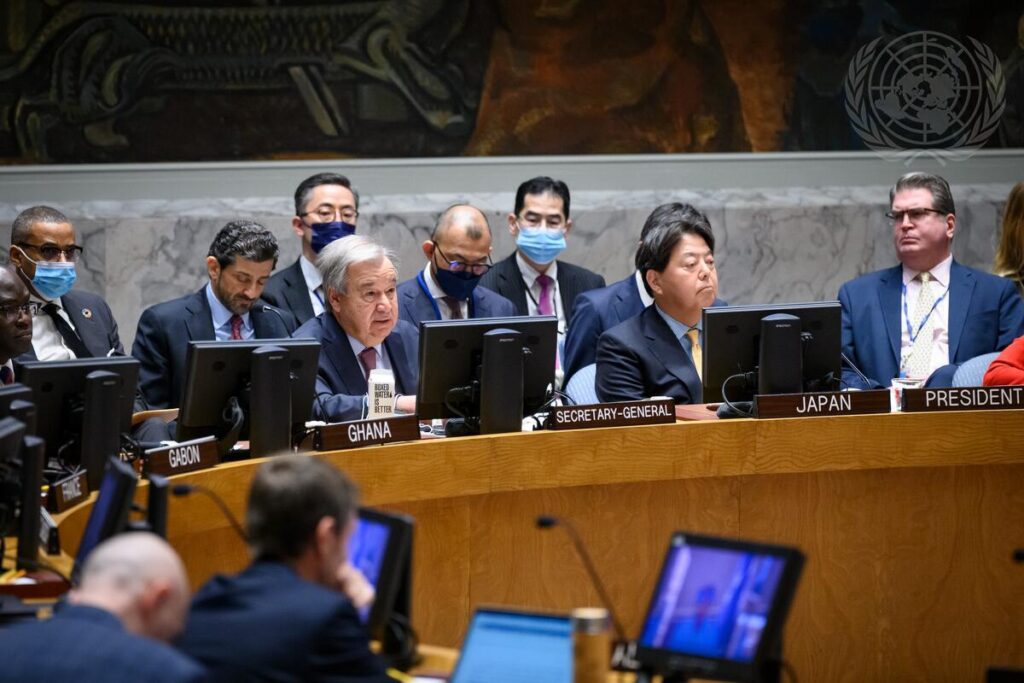New York, January 12 – The United Nations Security Council is called to find ways to promote and strengthen the rule of law as lawlessness has proliferated, from the illegal Russia’s war in Ukraine nearing one year old, the military takeover in Myanmar to the Taliban’s attacks on women’s and girls’ rights to education and North Korea’s nuclear tests.
Japan’s Foreign Minister Yoshimasa Hayashi, whose country holds the presidency of the 15-nation Security Council in January, called for a resolution on “Uniting for the Rule of Law,” with the council as the principal body responsible for it.
U.N. Secretary-General Antonio Guterres opened the debate with a statement that the rule of law is “foundational to the United Nations, and to our mission of peace. The Security Council has a vital role in upholding it.”
“From the illegal development of nuclear weapons to the illegal use of force, States continue to flout international law with impunity,” Guterres said. “The Russian invasion of Ukraine has created a humanitarian and human rights catastrophe, traumatized a generation of children, and accelerated the global food and energy crises. In every region of the world, civilians suffer the effects of devastating conflicts, loss of human life, rising poverty and hunger.”
He said North Korea’s development of nuclear weapons programs is “unlawful… and a clear and present danger, driving risks and geopolitical tensions to new heights. The onus is on the Democratic People’s Republic of Korea to comply with its international obligations and return to the negotiating table.”
The Talibanin Afghanistan have launched “unprecedented, systemic attacks” on women’s and girls’ rights to education and has undermined development activities in the country, he said.
Guterres said coups d’etat are back “in fashion” in recent years. One example is the military takeover in Myanmar in 2021, which led the country into a cycle of violence, repression and severe human rights violations.
“2022 was a deadly year for both Palestinians and Israelis,” he said. “We condemn all unlawful killings and acts by extremists.”
“The situation in Haiti is characterized by a deep institutional crisis and weak rule of law, widespread human rights abuses, soaring crime rates, corruption and transnational crime.”
Japan’s Foreign Minister Hayashi said the world is currently “beset by the war of aggression in Europe, and conflicts, violence, terrorism, and geopolitical tensions ranging from Africa to the Middle East to Latin America to the Asia-Pacific.”
“I believe that the rule of law is intrinsically linked with the responsibility of this Council. I believe that it is only through multilateralism that we can uphold the rule of law globally. I believe that the United Nations should be at the core of multilateralism. And, I believe that the Security Council should be the guardian of multilateralism.”
He said the proposed “Uniting for the Rule of Law” should draw on the U.N. Charter and resolutions adopted by the U.N. General Assembly related to the rule of law and friendly relations among nations. He said the rule of law should be “anchored in trust among nations” and should “never allows any country to rewrite borders by force or through the flexing of muscles.”
“Member States should unite for the rule of law and cooperate with each other to stand up against violations of the U.N. Charter, such as aggression against, or the acquisition of territory by force from, a Member State. Japan welcomes the efforts by Member States in this regard, and calls for further actions to end the aggression against Ukraine. Let us refrain from recognizing territorial acquisitions by force or supporting aggression directly or indirectly,” he said.
(By J.Tuyet Nguyen)
United Nations correspondent journalists – United Nations correspondent journalists – United Nations correspondent journalists – United Nations journalism articles – United Nations journalism articles – United Nations journalism articles – United Nations News – United Nations News – United Nations News

